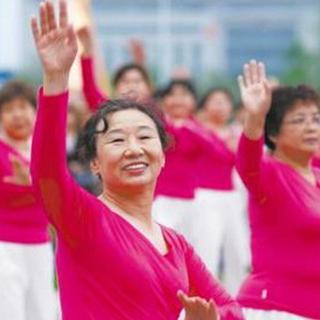
介绍:
Xiaohua: You are listening to Round Table. Let’s talk about another phenomenon that went up to the media headline during the golden week. Even though there were thousands of tourists in Shanghai’s Nanjing Road, the dama still did their routine square dance on that very busy commercial street. Some people think that it’s sort of like a special scenery, but others question that public dances occupy too much public space and also affect social order. So is it a problem?
Zhou Heyang: I think it’s a problem that we can see there is sort of a conflict between different groups of people for the use of public space. So for these Shanghai damas, they dance there routinely. You like it or not, it’s sort of the place where they have a little bit of exercise. And during the National holiday, maybe, there has been less damas there, but that is what they do every day. I don’t think you should take that away from the local people, just because there are more tourists. On the other hand, yes, there are more tourists want to go travel to Shanghai and go to the busiest road on the National week, so I think it’s lack of a designated space.
John: Yes, it’s part of it. But why are they even allowed to be there in the first place? I get it, yes, of course, everyone has the right to use public space, but the thing is it has to be respectful of other people. So the idea that they can occupy areas of Nanjing Road, which is a huge tourist area on regular day, doesn’t really make much sense to me at all. That’s really what it comes down to I think, is just it’s called management of public space. If you look at the United States for example, in some cases it has obviously gone too far. But, in general, if you want to use public space for event or a regular occurrence, you have to get a permit. Or it has to be on a small scale that doesn’t really affect anyone else.
Zhou Heyang: I think that’s all very good on paper, but here in China it seems like whenever there is an open space, people could take it up and damas are usually the group of people who…
John: Yeah, why aren’t the police doing anything about that?
Xiaohua: I think that’s my question as well, because like Heyang says, if they have been allowed to do this before, then they should probably still be allowed during the National Day holiday. But why were they allowed before? It doesn’t seem to be a very good decision to me. And especially because this is not a park. This is a street and they are just doing it right there on the street, not at a corner, not in front of a big empty space in front of a shop or something. It’s just right on the street. It’s on the street crossing, I think, the traffic street. So I do wonder why this is happening and if you extend this logic that everyone can hold a wedding in a public space or everyone can have a party in a public space.
Zhou Heyang: Yeah, I think that’s sort of the logic damas are holding and I think that’s really quite…I don’t really want to scold them, but you know, haven’t they learnt better? I mean this has been over the news repeatedly for different places that taking up too much public space that kind of thing.
John: I think one of the biggest issues facing Chinese society right now is the idea of public space. In the big problems that NO. 1, no one takes real responsibility for it. But they feel like they can use it however they wish. It’s just funny because, you know, would you like to look at dogs poppy everywhere things like that. Would you allow your dog to do that? Of course not. So why are you allowing your dog to do that in a public area? So this idea that some other is the ownership or any real stake in public space in how it’s used. I think that’s part of the problem. But just in general, the general scarcity of public space for larger-scale community activities is lacking as well.
Xiaohua: That’s true, but I still think that people should respect a public space.
大家还在听

